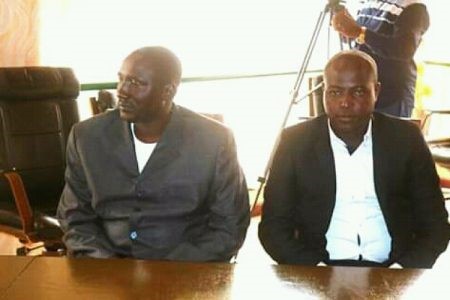Central African Republic CSO Protest Foreign Rebel Leaders On Electoral List

Civil society organisations in the Central African Republic have expressed anger over the registration of rebel leaders Ali Nassaraza Darassa and Sidiki Abbas on electoral lists when they are not Central African Republic nationals.
Working under the auspices of Groupe de Travail de la Societe Civil – Civil Society Working Group – (GTSC), the civil society leaders cite Article 3 of the country’s Electoral Code for their opposition.
The code states: “Electors are persons of the two sexes who are nationals of the Central African Republic aged 18 years and above at the time of registration, enjoying their civic rights and who are regularly registered on the electoral list.”
Darassa, who is the leader of the Union for Peace in the Central African Republic (UPC) rebel movement, is alleged to be a Nigerian while other sources hold that he is from Niger.
On the other hand, Abbas, the leader of Retour, Reclamation et Rehabilitation (3R) rebel movement, is a Cameroonian who was an ardent opponent of the Yaounde regime. He was hunted by the Cameroonian authorities thus forcing him to escape into exile in the Central African Republic.
In a recently published communiqué, the GTSC condemned the act of registering foreigners on the country’s electoral list, saying it dishonoured Central Africans.
The civil society leaders deplored the silence of the government and the political class of the country in the face of the political skullduggery.
Speaking for the GTSC, the group’s spokesperson, Paul Crescent Beninga, declared: “The GTSC through my voice, condemns the enrolment of armed mercenaries in the persons of Sidiki Abbas and Ali Darassa on the electoral list because these two persons are foreigners and the electoral law of our country prohibits foreigners from being registered on the electoral list. They are mercenaries and have no place here.”
The GTSC said it was surprised by the silence of the political class, notably the political parties, both of the opposition and of the presidential majority, and calls for an audit of the electoral register before the convocation of the electoral corps.
“It is an illegal act, it is an act that we must condemn. That is why we are taking advantage of the act to call for an audit of the electoral register.
“From what has happened, the register is already filled because people who have no right to vote in this country have been given an open sesame, the spokesperson said.
The GTSC declaration comes just days after a joint mission composed of government agents, parliamentarians and facilitators of the February 6, 2019 Accord of Koui in Ouham-Pende region. The mission launched the electoral registration in the region and also facilitated the freeing of three soldiers who were held hostage by the 3R rebels.
Support Our Journalism
There are millions of ordinary people affected by conflict in Africa whose stories are missing in the mainstream media. HumAngle is determined to tell those challenging and under-reported stories, hoping that the people impacted by these conflicts will find the safety and security they deserve.
To ensure that we continue to provide public service coverage, we have a small favour to ask you. We want you to be part of our journalistic endeavour by contributing a token to us.
Your donation will further promote a robust, free, and independent media.
Donate HereStay Closer To The Stories That Matter




